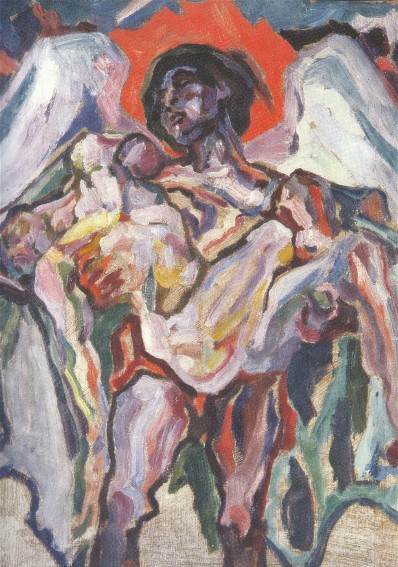Expressionism
Expressionism. A movement in the plastic arts that originated during and immediately after the First World War and had the greatest impact in Germany and Austria. The expressionists revolted against representational conventions and sought a new spontaneity and an intensity of inner vision. From this followed the intensely subjective expression, emotivity, exaggeration, and distortion that are typical of the movement. In Ukrainian art expressionism was quite moderate and was represented mainly by Oleksa Novakivsky, Anatol Petrytsky, Oleksa Hryshchenko, Mykola Butovych, Myroslav Radysh, and partly by Alexander Archipenko (in sculpture). Jurij Solovij, Liuboslav Hutsaliuk, and other modern painters in the West have been influenced by American (the so-called New York) expressionism.
In literature, as in painting, expressionism emphasized the inner significance of things and not their external forms. It paid more attention to the effect of imagery, language, and sound than to content, in order to evoke a state of mind. In Ukrainian literature, the reverberations of expressionism did not last long, although they left their mark on poetry, prose, and drama. In the 1920s, the poet Valeriian Polishchuk was influenced by German expressionists such as W. Hasenclever, K. Edschmid, and J. Becher. The most important representative of expressionism in Ukrainian literature was Mykola Khvylovy; his short stories were a combination of expressionism and neoromanticism. The poetic expressionism of Teodosii Osmachka (in his first collection, Krucha [Precipice 1922]) and Mykola Bazhan was fresh and original. In drama Mykola Kulish’s 97 and Narodnyi Malakhii (The People's Malakhii) and Ivan Dniprovsky's Liubov i dym (Love and Smoke) and Iablunevyi polon (Apple-Blossom Captivity) showed an affinity to expressionism. Dniprovsky's prose was also expressionistic (eg, Dolyna uhriv [The Valley of the Hungarians]). Elements of expressionism are also evident in the poetry and plays of Ivan Bahriany. At the beginning of the 1930s socialist realism was imposed by the Soviet authorities and thus expressionism declined and disappeared. The expressionists became victims of political persecution. M. Khvylovy committed suicide; others (V. Polishchuk and M. Kulish) perished in Stalin’s camps, fell silent, or followed the official Soviet cultural line (M. Bazhan).
Sviatoslav Hordynsky, Ivan Koshelivets
[This article was originally appeared in the Encyclopedia of Ukraine, vol. 1 (1984).]

.jpg)
